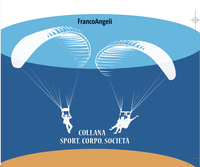Sport, Body, Society

"Sport, Body, Society" is an editorial Series, which offers itself as a space of multidisciplinary scientific knowledge about sports and physical activities, in order to trace new paths and identify new approaches to study and to cultivate these popular phenomena.
This editorial Series is published by FrancoAngeli, Publisher in Milan. It is a multidisciplinary editorial series: 9 are the scientific areas: the business-economic area; the legal one; the pedagogical one; the political-institutional one; the psychological one; the sociological one; the statistical one; the historical one, and the technical-sporting area.
It is recommended by national and international scientific networks, such as the Italian section of the Eass-European Association for the Sociology of Sport; the Inshs-International Network for Sport and Health Sciences; the Sismes-the Italian Society of Sport and Sports Sciences.
The SCS Series offers qualified books, which were selected through a rigorous dual peer review: the proposed works are presented at the Publisher only after they have passed the qualified judgment of two specialists in the field.
This editorial Series offers concrete support at the Author(s), both in terms of content and editorial - text control and support in production in the ready camera copy format - and at a promotional level (introductions in Universities and cultural Centers), sending press releases of the new books, and their distribution in the bookshops).
The "manifesto" of the SCS Series suggests the idea that in contemporary society sport has become a "total social fact" (M. Mauss, Essai sur le don, 1925), from at least three points of view:
- Sport is a "total" social factor, because it offers the chance to grasp the structure of the new emerging society. The media coverage of Mega sport events - such as the Olympic Games or the International Football Championships - is not a trivial phenomenon (for the chance to watch famous teams or athletes by TV set in my home), but it is an opportunity to observe changes in host cities and countries, in the "post" -industrial and global economy, in political events, in consumer behaviours, etc.
- Overmore sport is a "total" social factor, because it is a diffused educational resource in the socialization process of children and teens. The ethics of fair play and the other values, affirmed by the Olympic Charter, often are accompanied by requests to make the athlets' body an expressive vehicle of personal identities and social culture, as well as the communicative space for logos and brands of companies, and the object of continuous care in gyms and in wellness/fitness centers.
- Finally, sport is a "total" social factor, because the sports associations are spread throughout the territory; they are a nursery of athletes and of technical-sporting knowledges, whose growth requires professionals in the field of Movement Sciences, today increasingly equipped to recognize and solve the many bio-medical, technical-sports and socio-organizational problems - which continuously involve the sports sector as well.